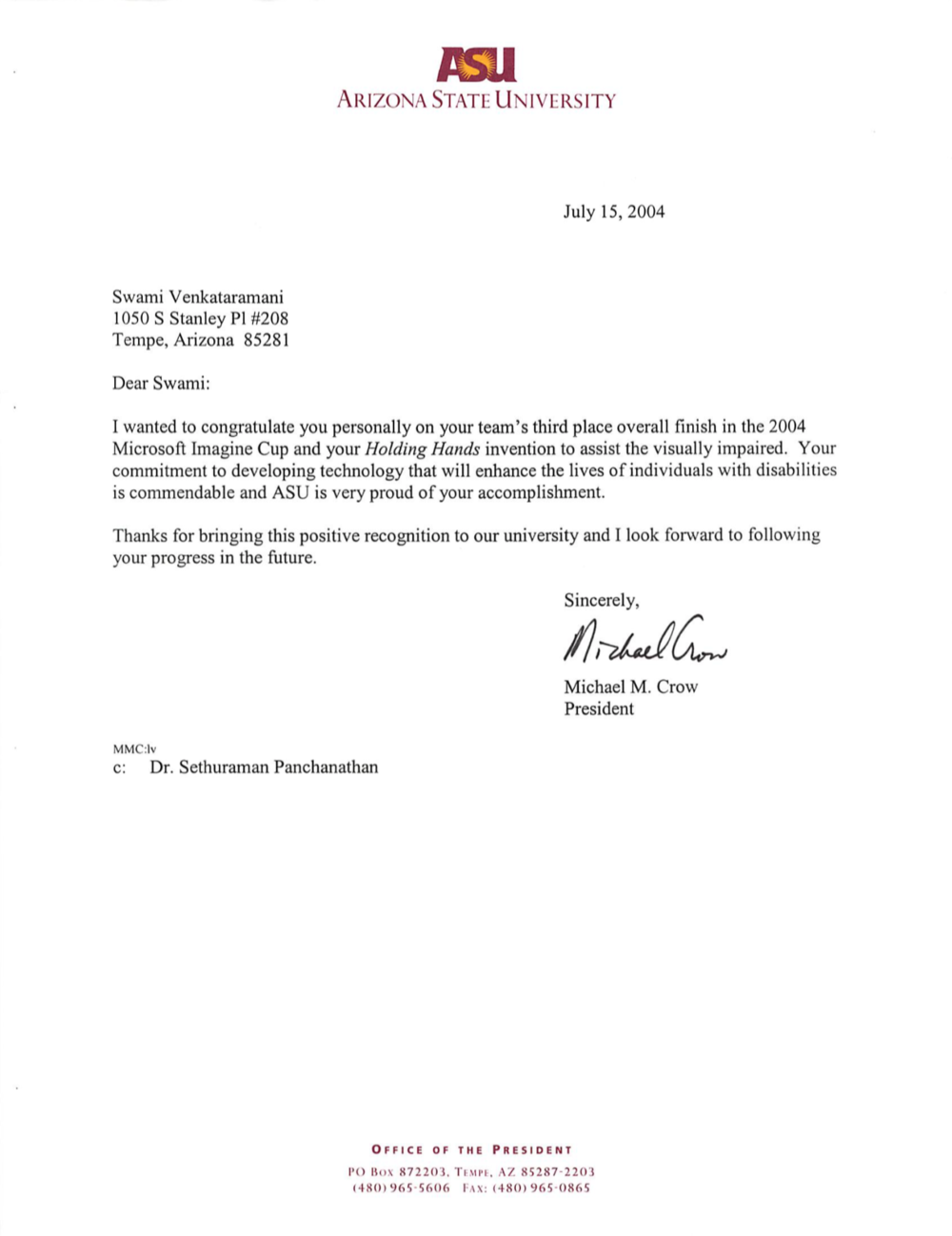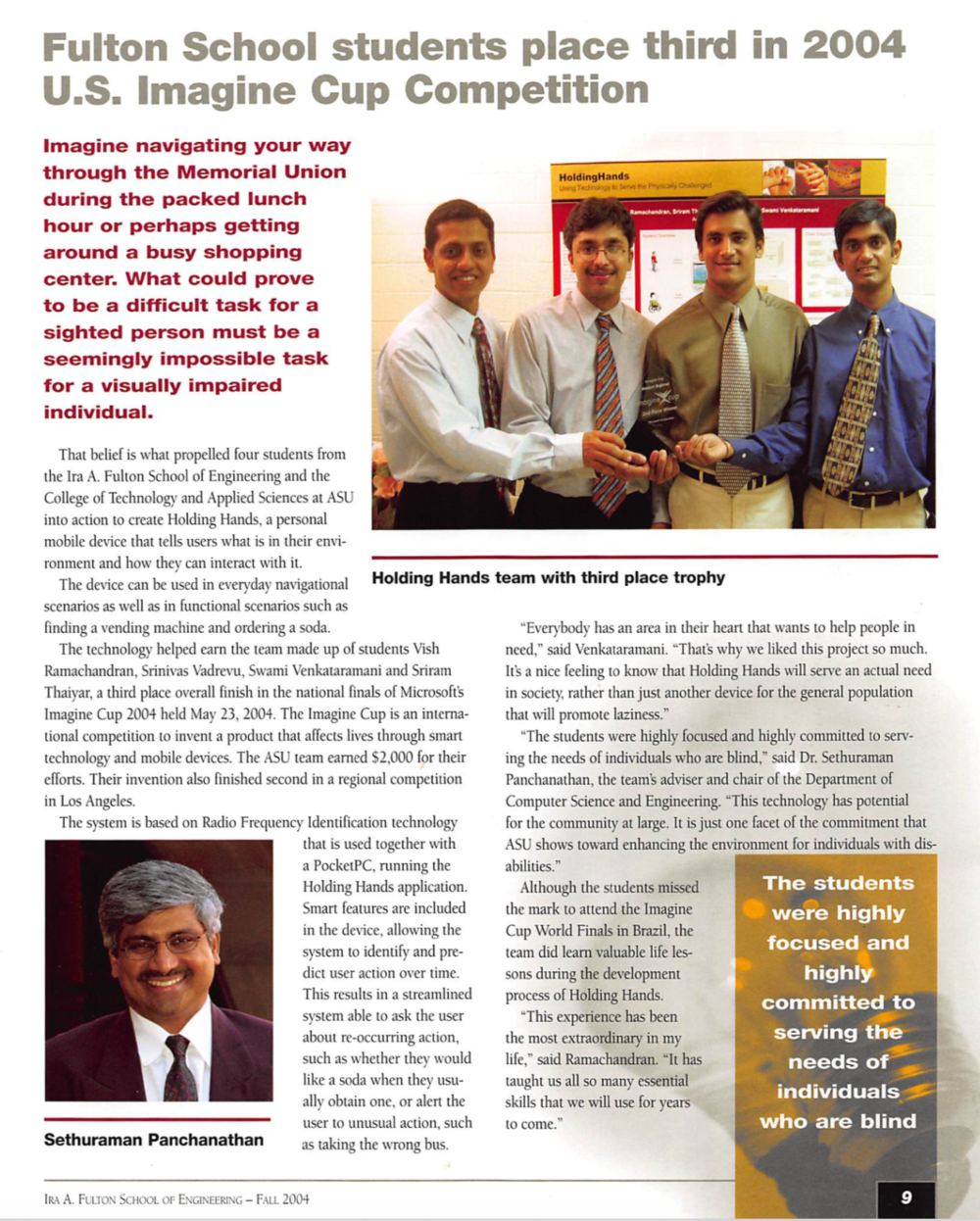What My Mentor Taught Me
Dr. Panch has been in the news lately. President Trump picked him to lead the National Science Foundation. A lot has been written about his successful roles in academia, research, innovation, and leadership. But who is he on the inside? Having known Panch for over 20 years as my mentor, I thought I'd share some unique perspectives about him that I believe are the secrets to his success. While I've learnt many life lessons from Panch, I’m going to share the ones from one particular chapter of my life.
In 2004, I participated in a global inter-university software competition, with my friends Vish, Sriram, and Srinivas. Panch, who was a computer science professor at ASU, was one of the judges in our first round.
During my demo, I made a remark about another team that went before me—I pointed out a technical challenge the other team had encountered, which they mentioned in their presentation. We faced the same challenge, and, I thought if I reminded the audience that the other team faced the same problem, it wouldn’t make us look as bad.
We did well—we won that round, which means we were going to the Western Regionals to compete with other universities. That evening, we went to meet Panch at his home—to share our excitement, but instead of a pat on the back that we were expecting, we realized that he was disappointed with us. He told me, sternly: “Swami, when you present to an audience, you never want to point out a negative thing about another presenter.” Panch cares a lot about other people. We learnt our lesson. Own your problems. Admit your failures. Don’t use others to justify your gaps.
Surprisingly, we won at the Western Regionals as well, which means we were going to the National Finals. We really didn’t expect to beat teams from Stanford, UC Berkeley, and other top universities in the west coast. We asked Panch if he’d coach us for the next round.
Let me tell you about the app we were building. After we signed up for the competition, we brainstormed many ideas. We called Panch to see which one he liked (we didn’t know then, and neither did he, that he was going to be a judge in the first round). Panch didn’t like any of our ideas. He said, all your ideas are going to make couch potatoes better couch potatoes. Why don’t you guys do something that will make a real difference in society? And so, we decided to build a mobile app to help individuals who are blind. We had a cheesy name for it: Helping Hands. And yes, I brag to people that we built a mobile app three years before the iPhone! But…if we were going to build an app for the blind, then there was another lesson to be learnt, from Panch.
During my first demo, I made yet another mistake, in Panch’s book. I described our app as “an app that would help blind people”. After the demo event ended, Panch took us to the corner, and corrected us. I still remember him pointing his finger at the four of us: it’s not “blind people”. It’s “individuals who are blind”. You don’t define a person by their disability. They have a disability, but that’s not their defining characteristic as a human. I didn’t really understand the difference immediately, but if you think about it, it makes a lot of sense. Just because somebody is blind doesn’t mean that that’s the adjective that describes them the best. Panch is an extremely sensitive person, with an extremely high level of empathy for others. Small things like this mattered to him a lot.
We were well prepared for the third round. Panch’s advice was that if we wanted to build something of real impact, we’d have to work closely with individuals who are visually impaired. We wouldn’t be able to pull it off by simply imagining what they need. What we think somebody needs and what they really need could be very different. Panch connected us to two of his brilliant students who were visually impaired, David and Ken, who helped us fine-tune our vision. Our app would help you navigate around the neighborhood (GPS was not widely available back then, so we used RFIDs), and help you order food at a restaurant, call elevators, and operate lights and fans, via voice commands.


Panch told us if we wanted to win, we would have to take Ken and David with us to the demo. “You are not going to win this with powerpoint slides. You’ll need to show the app working with real people.” Here’s the lesson Panch taught us. Go all in, or don’t go. Put everything you’ve got into it. There’s no room for mediocrity. Being a perfectionist can sometimes work against you, but I don’t believe that Panch is a perfectionist. Rather, he strives for excellence in everything he does. There’s a big difference between seeking perfection and striving for excellence.
Ken and David both had summer internships, so they couldn’t come with us to San Diego for the demo. Instead we video-recorded them using our app on the streets near ASU campus. Unfortunately, our final demo didn’t go as expected. Our app crashed during our demo and we had to improvise. You can imagine our plight when we saw System Error on the huge projected screen in front of the live audience of judges and contestants. We got lucky though—the judges understood the potential of our app and awarded us third place despite our disastrous demo. Though we were upset, we were satisfied that we at least placed third. We weren’t going back home empty-handed. And not too shabby to beat teams from Harvard and MIT, right? So, we called Panch right after the event to share the happy news with him. We had just won an award on a national stage! Time to rejoice!
“Hello Panch! We won third place!”
We were expecting to hear “wow, congrats guys!”
“What? You came third? What happened to first???” Panch was extremely disappointed in us. Third place didn’t mean anything to him. How could we not come first?
Just pause for a moment and think. What audacity does he have to expect us to win a contest where hundreds of teams from top universities across the country were participating in? But here’s the lesson we learnt: if you truly believe you can achieve something, you can achieve it. Anything. When Panch does something, he believes in it. Fully. He believed in us. He believed that we would win it. There was never a doubt in his mind that we would win first place.

A nice letter we received from ASU’s president.
I’m lucky to have him as my mentor. The lessons that I learnt from him over the years continue to guide me till this day. There were many lessons on commitment, excellence, and hard work. But the most important lesson that I learnt from him, and continue to learn from him, is how to be a good person. Ask anybody who knows him, and they’ll tell you they have never seen Panch without a smile. From someone who knows this person deeply, I know why they picked him to lead the NSF. I’ve seen him transform ASU. I’ve seen him change people’s lives. I know he is going to make our science very strong.

(Fun fact: after us, two other teams from ASU in later years were coached by Panch, and went on to win the world finals of the Microsoft Imagine Cup.)